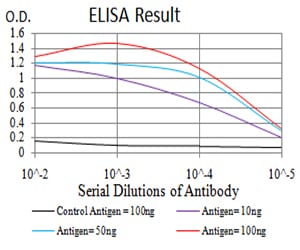
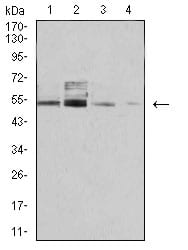
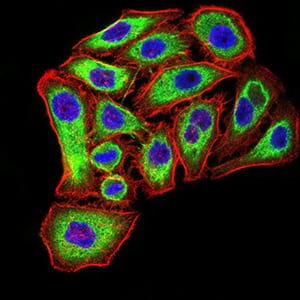
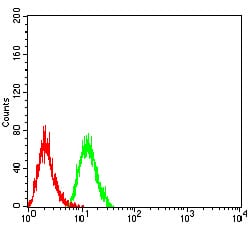
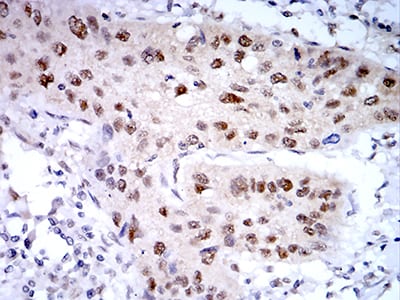
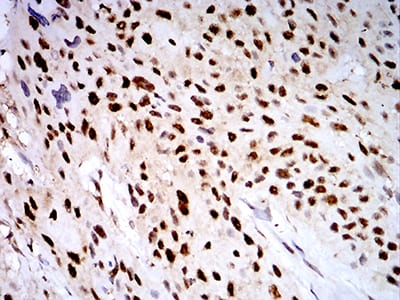
| WB | 咨询技术 | Human,Mouse,Rat |
| IF | 咨询技术 | Human,Mouse,Rat |
| IHC | 咨询技术 | Human,Mouse,Rat |
| ICC | 技术咨询 | Human,Mouse,Rat |
| FCM | 咨询技术 | Human,Mouse,Rat |
| Elisa | 咨询技术 | Human,Mouse,Rat |
| Aliases | TBP1 |
| Entrez GeneID | 5702 |
| clone | 1G10B7 |
| WB Predicted band size | 49kDa |
| Host/Isotype | Mouse IgG1 |
| Antibody Type | Primary antibody |
| Storage | Store at 4°C short term. Aliquot and store at -20°C long term. Avoid freeze/thaw cycles. |
| Species Reactivity | Human,Rat,Monkey |
| Immunogen | Purified recombinant fragment of human PSMC3 (AA: 53-152) expressed in E. Coli. |
| Formulation | Purified antibody in PBS with 0.05% sodium azide |
+ +
以下是3篇关于Palladin抗体的参考文献,按文献名称、作者及摘要内容简要概括:
---
1. **文献名称**: *"Palladin is a novel binding partner for Ena/VASP family members"*
**作者**: Otey CA, et al.
**摘要**: 研究揭示了Palladin通过与Ena/VASP蛋白家族相互作用调控肌动蛋白细胞骨架的动态组装,实验中采用Palladin抗体进行免疫共沉淀和免疫荧光定位,证实其在细胞迁移中的作用。
---
2. **文献名称**: *"Palladin expression is a marker of invasive behavior in breast cancer"*
**作者**: Parast MM, Soto J.
**摘要**: 通过免疫组化结合Palladin抗体分析乳腺癌组织,发现高表达Palladin与肿瘤侵袭性和转移能力显著相关,提示其可作为临床预后标志物。
---
3. **文献名称**: *"Palladin regulates cell motility via interactions with Myosin VI in pancreatic cancer"*
**作者**: Luo Y, et al.
**摘要**: 研究利用Western blot和免疫荧光(基于Palladin抗体)证明Palladin与Myosin VI的结合促进胰腺癌细胞迁移,敲低Palladin显著抑制肿瘤侵袭性。
---
如需更多文献或具体期刊信息,可进一步补充关键词或研究领域。
Palladin antibodies are essential tools in studying the Palladin protein, a cytoskeleton-associated molecule implicated in cell adhesion, motility, and structural organization. Discovered in the early 2000s, Palladin is expressed as multiple isoforms (e.g., 90 kDa, 140 kDa) generated by alternative splicing, with roles in actin filament bundling and focal adhesion dynamics. It interacts with proteins like VASP and α-actinin, influencing cell migration and mechanical signaling. Dysregulation of Palladin has been linked to pathological processes, particularly cancer metastasis, where its overexpression in tumors (e.g., pancreatic, breast) correlates with enhanced invasiveness. Research also associates Palladin mutations with hereditary neurodevelopmental disorders.
Palladin antibodies are widely used in techniques such as Western blotting, immunofluorescence, and immunohistochemistry to detect expression patterns, subcellular localization, and isoform-specific functions. Their development required careful epitope targeting due to isoform diversity, with many antibodies validated against specific regions (e.g., immunoglobulin-like domains). Challenges include ensuring specificity, as cross-reactivity with paralogs (e.g., myotilin) may occur. Recent studies utilize Palladin antibodies to explore its role in tumor microenvironments, fibroblast activation, and mechanotransduction pathways. These reagents remain critical for unraveling Palladin's dual physiological and pathological roles, offering potential diagnostic or therapeutic insights in cancer and connective tissue diseases.
×